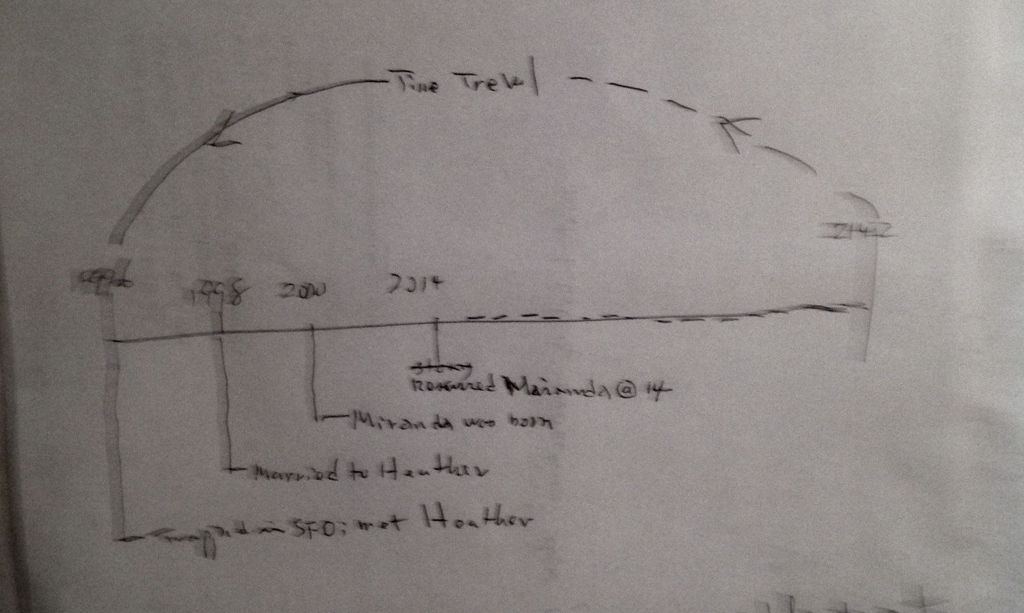Surprisingly Good by Mike Chen
Surprisingly Good
Mike Chen
Let me tell you one thing I learned about becoming a published author, a public figure of sorts. It feels terrifying enough thinking that a random person out there could be reading this heart-and-soul thing you’ve crafted—in my case, a father/daughter time-travel story called Here And Now And Then. It feels even more terrifying when you dare to actually peek at what random people say about the book on Goodreads or Amazon.
Yet, both pale compared to the terror I felt when my dad read it.
My Chinese dad.
My very, very, very Chinese dad.
This deserves to be put in proper context. My dad is 75. He is a very unusual blend of being a Chinese Dad stereotype with a surprisingly artistic mind. He’s a retired engineer, he never hires people to repair stuff, he doesn’t talk about his feelings, he drives a 20-year-old car. On the other hand, he reads Emily Dickinson, studies Greek mythology, and knows Shakespeare inside and out.
And he shows how he cares by “helping”—which, really, when your 75-year-old dad offers to “help” fix the roof, you should say no. This “helping” includes “advice” on running my life despite me turning 40 this year and being what I would consider reasonably successful at things both personal and professional.
Now, I knew my parents would buy my book because, of course, they wanted to contribute to my income. Knowing my dad, he probably figured out some way to make that purchase a tax write-off.
I wasn’t, though, expecting him to actually read it.
My dad is actually a pretty voracious reader, but sci-fi is not up his alley, despite being a huge fan of the original Star Trek. During my teen goth phase, I managed to convince him to read Interview with The Vampire, and shockingly he liked it. But still, I figured my parents would just take photos of my book to email their friends and that would be it.
Nope.
Nope, nope, nope. A few days after book launch, I got an email from him saying he’d started to read it.
His only note? “The first chapter is very confusing. I had to read it twice.”
The next day, he sent me a very blurry photograph. He had read the first chapter again and sat down and drew a diagram. There’s a stick figure on the right and then a big arrow that arcs over backwards, ultimately pointing to another stick figure on the left. Above that is written TIME TRAVEL.
Then he took a photo of this (and apparently forgot to turn on the lights when he did that) and sent it.

He also included the note that I should consider sending his diagram to my publisher because “it might help readers out.”
I told him I’d pass that along to my editor.
Other highlights of our exchanges over the next few weeks:
- He also noted that the printing quality was “not very good,” and the ink was too light: it should be darker and heavier.
- He asked why the chapters only had numbers and no titles.
- He offered “suggestions” on my word choices several times.
- He asked if I had considered a Chinese version of the book. I told him that there was a foreign rights team that sold it to publishers in foreign territories. He said that one of his friends is a Chinese children’s book author and I should consider putting the manuscript in Microsoft Word and using the built-in translation tool and sell to that market. Because “there are a lot of readers in China.”
I pondered what to do with all this: politely reply, avoid the comments, or maybe even ignore the whole thing. I talked with my wife about all of this. My wife is very American, and it’s taken her years to understand the quirks of my family, but now I think she gets it more than I do. She pointed out that normally he says “it’s okay” and doesn’t get involved. But he read it and took the time to actually comment on it. Maybe, under all of the backhanded compliments and strange suggestions, it’s the only way he knows how to show he cares.
To “help.”
He did finish it. When he did, he sent the strangest note. First, he said it was “surprisingly good.” I’m glad I upended his expectations.
I was not expecting him to upend mine.
My dad is a man of few words. So few, in fact, that he often hangs up the phone without even saying bye. And yet, now here was this note from him that was equal parts eloquent and thoughtful: he said I should consider my career path wisely because I wrote a very good book and I shouldn’t pursue day jobs at intense Silicon Valley companies that might inhibit writing further books. “You are imaginative and creative. We believe in you!” (With an actual exclamation point at the end).
So somewhere beneath the obtuse comments and critical pointers really does lie someone who gets it, and appreciates it—maybe the person who reads Dickinson and Shakespeare snuck out from the crusty facade for just a moment and exposed himself in ways that would make a retired Chinese immigrant engineer very, very, very uncomfortable…but make a father proud.
Because that’s how he shows he cares. Not through what his words actually say, but by “helping.”
By the way, my mom still hasn’t read it.
© 2019 Mike Chen
=====
 Mike Chen is the author of Here and Now and Then and A Beginning at the End. A lifelong writer, he has contributed to major geek websites (The Mary Sue, The Portalist, Tor), covered the NHL for mainstream media outlets, and is super proud of his Star Trek: TNG fan fiction. A member of SFWA and Codex Writers, Mike lives in the Bay Area, where he can be found playing video games and watching Doctor Who with his wife, daughter, and rescue animals. Follow him on Twitter and Instagram: @mikechenwriter
Mike Chen is the author of Here and Now and Then and A Beginning at the End. A lifelong writer, he has contributed to major geek websites (The Mary Sue, The Portalist, Tor), covered the NHL for mainstream media outlets, and is super proud of his Star Trek: TNG fan fiction. A member of SFWA and Codex Writers, Mike lives in the Bay Area, where he can be found playing video games and watching Doctor Who with his wife, daughter, and rescue animals. Follow him on Twitter and Instagram: @mikechenwriter
Join our community
Get the book
